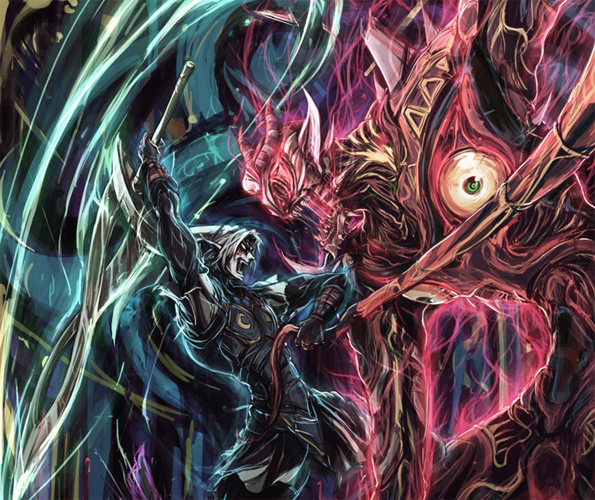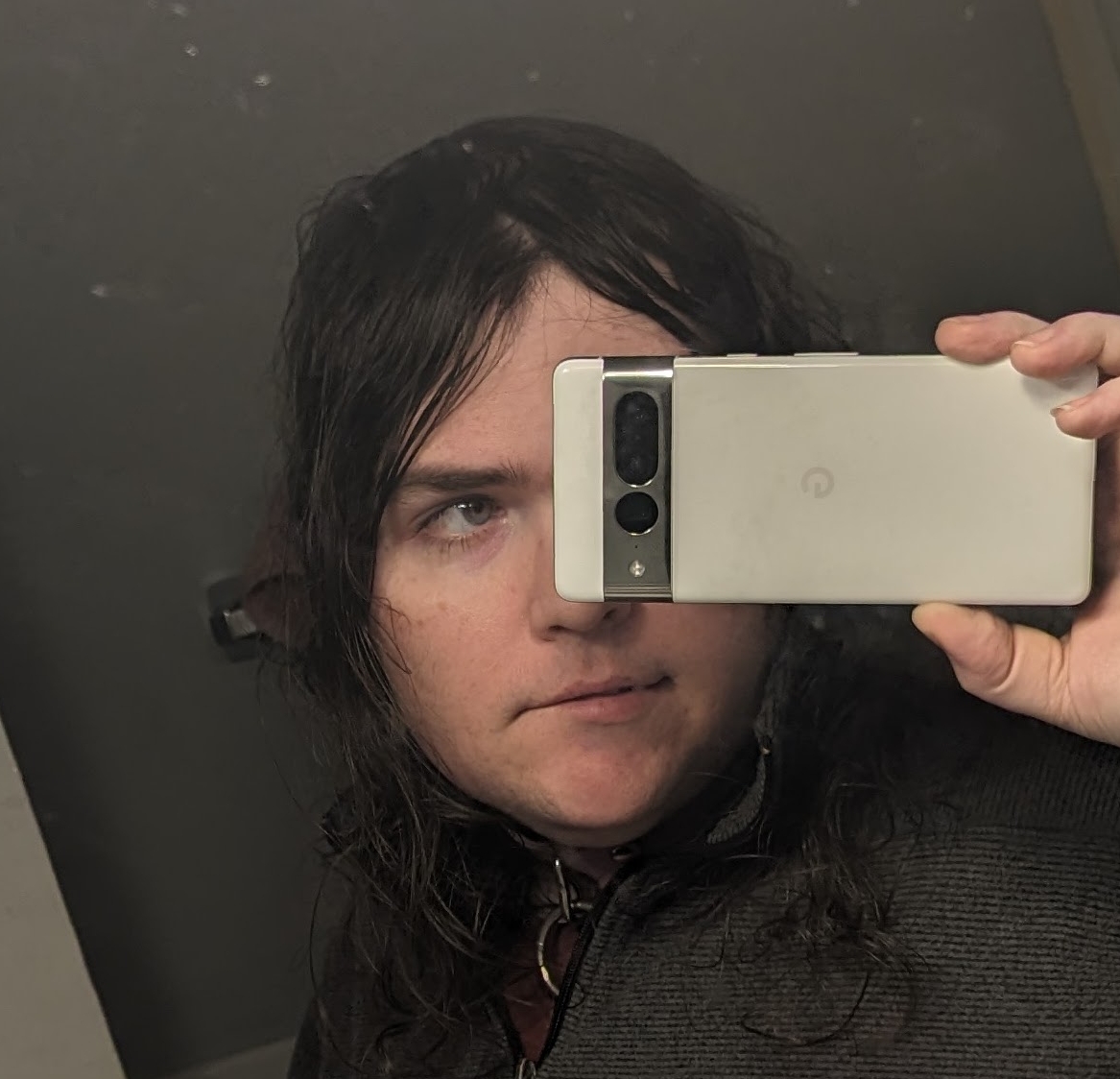Another player who was at the table during the incident sent me this meme after the problem player in question (they had a history) left the group chat.
Felt like sharing it here because I’m sure more people should keep this kind of thing in mind.
Why would that even be a problem? Plenty of blind people in ancient stories, myths and legends. Probably better off without this person.
I mean on one side you’d have the magic to heal many if not all disabilities.
On the other hand in reality we have wheel chairs and stuff to heal and prevent many diseases, too, but still not everyone can get those…
We have the ability to make Tuberculosis not exist and have for half a century. At least 1.6 million unnecessary deaths occurred because of it in 2022. Anyone who can’t think further than the first point has the thought capabilities of a gnat.
I just found John Green‘s account.
On a serious note, it is really sickening to hear stuff like this. It’s not even that those drugs are crazy expensive or extremely difficult to distribute. It’s just greed and very bad distributed wealth
We have the ability to make Tuberculosis not exist and have for half a century.
Please tell me more. My knowledge about this must be very outdated.
There are a lot of things that are really only failing for a lack of distributing ressources. But Tubercolosis (where our once widely used vaccine was mostly ineffective in eradicating it and the treatment is complicated and long requiring monitoring of each patient because of the possibility of secondary infection from the antibiotics or organ damage) is not what comes to my mind first, second or for quite a while.
In fact in both cases research is ongoing in search for more effective vaccines and easier treatments (primarily for shorter treatment periods as well as against the multiple antibiotic resistences), because our tools today are not actually up to the task.
As a fun saying goes “The future is here, it’s just not evenly distributed”
The same could easily apply to magics of many kinds
Every time I see shit about cutting edge prosthetics with near-full motion capability, controllable via muscles and nerves or whatever they even use nowadays, I’m reminded of my friend from work who couldn’t even afford something beyond a simple plastic harness arm that essentially is just to make it look like he has an arm, with no utility value.
He would take it off during work because it just got in the way, but wore it out to avoid all the questions about it with randos.
Every time I see things about cancer treatments I’m reminded of a few people I knew from my parents social events that have died in the last 10 years simply because they couldn’t afford the treatments. A few even got divorced to keep their debt from ruining their spouse after they’re gone.
The future can be here all it wants, but until everyone has access to it, we may as well be considered a medieval society.
The Blind Swordsman is a massive trope in fantasy literature. Take a look at David Carradine’s character in Circle of Iron for an archetypal example. It’s a staple in many kung fu movies - the Master uses their hyper developed senses for sounds and for movements in the air to sense and react to their enemies. Or take Luke Skywalker fighting the drone with his eyes covered by using the Force. Hodr was the blind son of Odin.
Blindness also occurs throughout mythic traditions, sometimes as punishment by the gods. It occurs in Greek and Jewish myths. The witch-woman in Hawk the Slayer was blind (played by the great Patricia Quinn, who also starred as Magenta in Rocky Horror).
I think it makes perfect thematic sense to include blindness in characters. A blind beggar, a blind prophet, or a blind samurai are all staples of the fantasy tradition. I’d actually love it if we had to work out a player character who is blind, but that would take a fair amount of effort. I think the payoff would be remarkable and memorable, though.
Critical Role had a guest playing a blind character. It was a wizard with folk hero background who used his bird familiar to see. He was awesome.
I could swear he was a cleric who somehow had the familiar spell. Yeah, cleric: https://criticalrole.fandom.com/wiki/Shakäste
It depends on the tone of the setting. Someone who gets their leg broken in a Forgotten Realms game can usually find a small-time priest to cast Cure Wounds on them, preventing most disabilities that aren’t from birth. Someone who gets their leg broken in Warhammer Fantasy has to hope within their gimped traveling distance that there’s a priest of the correct faith capable of appeasing the gods for the healing to happen, before their detriments become permanent. As such, having a disabled character in a game with more accessible healthcare requires an extra degree of explanation, on top of the PCs’ and players’ emotional response to someone being so downtrodden. The circumstances of their ailment, who or what was responsible, how they see their ailment and work around it, all are weights on the players’ suspension of disbelief that a GM has to take into account that they generally otherwise wouldn’t with John Miller, the able-bodied dude who runs the mill with a wife, three kids, and a problem with rats stealing the grain that he mills. It’s like a Chekov’s Gun in that sort of way, the GM as a storyteller surely wouldn’t spend the effort to decide that an NPC has a trait that is notably separate from the default without it being somehow relevant to the plot. The mage asks the party to do a quest for their magical research, a general asks the party to do a quest for national security, and a person in a wheelchair… what desire do you give them that wouldn’t be misconstrued as able-ist or a waste of that character trait? It’s very difficult, often comes with an air of making some kind of a statement, either that they’re a writer capable enough to wear disabled-face without it being offensive, or taking a preachy high-ground telling people a message about human sympathy, determination, and adaptability that they’ve already been made well aware of by the existence of popular culture.
It’s like a Chekov’s Gun
this is the root of your misunderstanding. diversity doesn’t require a plot hook, let people just be different and let people who are different in real life be represented in the media they consume.
I don’t have a problem with having disabled people in a TTRPG setting, but I hate the “it’s fantasy, stop whining about realism” argument.
Removed by mod
It is like saying a Wizard isn’t allowed to have glasses.
Well it is quite strange to be so offended of disabled people that you would leave the game But as a devil’s advocate what the problem is actually a world building one. If you establish that the world has magic, magic is widespread and powerful then the fact that there are disabled people could be slightly immersion breaking. For example in DnD lesser restoration a 2nd lvl spell would cure most blindnesses (well except if the person has actually lost their eyes). Hard to say anything more because you gave so little details. Ultimately that person had a disproportionate response but I find your meme both pointless what aboutism and generalization. Hope you have a good day.
Exactly, lesser restoration is a spell 5th level clerics can cast, it won’t be super common but every temple should have someone in charge at that level at least. I’m not saying it’s impossible for people to be blind or otherwise have physical dysfunctions but magic on the scale dnd assumes means there will be lower rates of it. Did the player overreact? Yes, but he wasn’t 100% wrong
What I won’t accept is that for some reason, all the illustrations that depict this use the hospital wheelchair design. If you are an adventurer who goes into dungeons, you should be getting something that can handle that terrain better than a squeaky shopping cart. Go for the fantasy version of Professor X’ flying chair. Or at least get something with all-terrain wheels, and have them angled like the ones in the wheelchairs athletes use.
I’m picturing something that walks like a spider.
I’ve seen them somewhat often in RPGs and related material. There’s those who are blind, frail, deaf, weak or lacking a skill to do something necessary. Even Basic D&D had notable penalties for rolling INT 3-5, being illiterate to start with.
NPCs in fantasy settings still have hinderances, and they’re expected. Maybe they can be neutralized by healing magic in D&D, or there may be equipment that works around them. The wrong part is shutting down the concept, as that’s contempt for the weak (technically a symptom of fascism.)
I’ll echo the words of my friend, who is a permanent wheelchair user:
“Yes, I identify with my disability as part of who I am, but I would still take a cure without hesitation”
Yes, people with disabilities identify with their disability, so even in a fantasy setting I can see how their disability would be part of their character.
But every disabled person I know would figuratively leap at the opportunity to reverse their disability with magic. It is also basically impossible to use a wheelchair while holding something like a wand or a staff or a fireball in one hand, so if there’s enough magic around to push a wheelchair, there’s probably enough to make your legs work. That’s why somebody has a good reason not to expect a wheelchair in a fantasy world. I can see how somebody who doesn’t really know any disabled people would panic at the idea of a wheelchair being part of the narrative or something like that, and I can sympathize with it.
In our world we do have the magic to push a wheelchair around, and it’s not even hard to do this. Tinkerers can cast the spell of self-propelling wheelchair in their garages.
But magicing someone’s legs to work is still a far way off.
(Remember, when magic is well explained and documented, and people get used to it, they tend to call it technology.)
It’s a bit of a double-edged sword. Representation is great, because it makes us feel less like a shame to be ignored or scorned - but also, being disabled fucking sucks, kind of by definition, and it’s hard to take seriously people who peddle the ‘handicapable’ stuff. I don’t need any toxic positivity in my life, thanks.
The only people I have ever seen claim that disabilities aren’t so bad and you can live completely normal etc. are people with no disabilities at all. I’m not disabled, my eyesight is just shit and I don’t know what I’d be willing to do to get normal eyesight. Just to get rid of a pair of glasses. I can’t imagine the lengths someone actually disabled would go to in order to get a cure.
“I’m not disabled, my eyesight is just shit and I don’t know what I’d be willing to do to get normal eyesight. Just to get rid of a pair of glasses.”
I apparently would pay someone a large sum of money to zap my eyes with a laser using a giant machine with only the vague promise that after the laser burns heal, your vision will be better.
laser burns
Technically not burning. Even though (and nobody warned me of this before my procedure) it sure af smells like something is burning while the laser shines down on your exposed retina, that’s actually the smell of vaporised cornea.
TL;DR: laser vaporisation, not laser burning. Much more metal.
That somehow sounds even worse.
I mean, you’re correct but that meme’s vision of what a disabled character should look like in a fantasy setting is probably the most boring I’ve ever seen.
A manual wheelchair? In worlds where levitation, flight, telekinesis, etc exist?
Fuck, even the X-Men have a hovering chair.
Not only that, if you could afford a wheelchair or glasses in a medieval setting you can probably afford healing magic
I really don’t understand what’s wrong with people not “curing all illness and disability with magic™” in a world where magic exists and is a thing.
See, in most such fantasy settings, magic not only exists but it has an attitude. Sometimes, a conscience, and not a very ethically nice one (if it allows for eg.: necromancy!). Sometimes, magic even is a god (or gods). Even if they aren’t, the people who use magic are still ultimately humans (with leafy ears etc but still ultimately humans with costumes, at worst) driven by greed, envy or a weird righteous idea of how should a woman dress and behave when in public.
Would you trust some rando nutjob, who claims to speak for Evelok the Eternal Coffee Mug of Satisfaction, to up and magically conjure you new eyes, new arms, whatever? To alter your body to such a fundamental level? Normal people in such settings are already afraid to death of werewolves and those are quite normal things. Compare: even in our magicless, relatively normal world, we have the power and the money to cure most illness and to treat disabled people adequately yet Obamacare is not universal and we can not trust that the people who give people implants and prosthetics haven’t backdoored them to force those disabled people into corporate servitude.
Your player party may be the goodest bois, but they’re only one. The various guilds and churches around quite likely aren’t such goodies on aggregate either, or else there would simply be no plot.
There are deaf people in the real world with treatable deafness that opt not to because they don’t view their deafness as a disability. In addition, not all neurodivergent folks view their conditions as disabilities and wouldn’t change even if there was a “cure” for it.
So, I don’t see how disabilities in a fantasy setting would be different. It’s not even necessarily about trusting the cure, many times it’s about how folks view the condition and themselves.
The amount of people in this thread who assume everyone with any type of disability or difference in ability would even want to have their condition corrected is shocking. Why is it impossible to imagine a blind person who doesn’t want their vision fixed for no other reason than they believe they’re fine as is? Why is that such a difficult thing to grasp? Just because free magical heal exists doesn’t mean everyone automatically wants it. You don’t need to turn to other explanations about why it might not be trusted or affordable when you can just say “this person is blind and doesn’t particularly care to be able to see.”
I would guess that the vast amount of people with serious disabilities, paraplegic, blind, deaf, would jump at the opportunity to correct their issues.
That would go doubley so for someone who lives in a d&d style world with far greater dangers and less accomodations than our own.
Yes, but not everyone would. There are deaf people in our world today who don’t want to be able to hear.
https://www.insider.com/why-deaf-people-turn-down-cochlear-implants-2016-12
This developed because it couldn’t be fixed in our world, long enough for these people to develop communities, culture, and literally their own language.
In a world where it could always have been fixed, such communities and cultures are not likely to have ever developed, since the only people who could not get it fixed would be poor, and the poor are in a bad position to gather together in groups based on their shared experience and thus be able to form their own culture.
Furthermore, people not wanting to be cured today exist in a world where there already are significant accomodations for their disabilities. It is not likely these people would be able to do this if our society had not made the collective decision to put in the effort needed to accommodate disabilities.
You think poor people never had their own cultures? Lol, lmao
Magic doesn’t fix being poor
Yes, but that is because they’ve either grown up that way or have been deaf for so long that they’re fully integrated into the sub culture. In a fantasy setting, deafness would be taken care of before it could influence people culturally
They’d force people to hear? That’s not fantasy, that’s authoritarian.
Parents finding out their baby was deaf would probably pay to get that healed asap. And people born with hearing and later lose it are probably going to want that fixed.
Also, your “argument” of gasp, authoritarianism!!!1! is nothing but a strawman and makes you look ridiculous
You’re moving the goal posts. Originally you said,
In a fantasy setting, deafness would be taken care of before it could influence people culturally
Now you’re saying they probably would while still taking a tone of me being wrong. You can’t agree with me that deaf people would exist while still acting like I’m wrong.
Also, what you described earlier is akin to eugenics. Forcefully fixing alleged disabilities without consent is absolutely authoritarian.
Forcefully fixing alleged disabilities without consent is absolutely authoritarian.
So a parent is wrong for wanting to fix their child’s disabilities? You’re actually insane if you believe that, and I hope you never have children
It’s a big case of “I don’t like myself as I am and this person with a disability accepts themself so there must me something wrong with me; I’ll take it out on them!” Style projection
No, it’s argued agaibst because it doesn’t make any sense logistically or economically.
And no, handwaving it away because “it’s a fantasy setting, realism doesn’t matter” is not an argument. There’s a thing called suspension of disbelief, which requires a settng to be internally consistent.
I couldn’t care less if there is a disabled character in a fantasy game. But it does beg the question: why would there be a magic character who relies on a real-world wheelchair when they presumably have magical abilities that would eliminate their disability, and why would that be someone’s fantasy?
That being said, it’s fantasy. You’re allowed to do virtually anything you want. It’s up to the DM to accommodate their players.
It may simply not be a disability in their eyes. If you can use magic your ability isn’t as grounded in your own physical ability. A fighter sure, but there are other classes that may not have a desire to “fix” what we would consider to be disabling!
This would almost certainly be similar to how people on the autism spectrum feel vs how people who don’t, expect them to feel.
I think the real problem is that magic in D&D is so mundane that any problem can be “magicked away”, be it healing a wound, curing diseases or exploding an enemy. That makes some situations only really plausible when it’s explained as some stronger magic or “weird power” interfering with common magic.
It’s a magical fantasy setting, I get it, but magic being so common and consequence free makes it a deus ex of whatever flimsy explanation you can imagine. “Why do disabled people exist in typical D&D?” Cue that meme of the cartoon’s Dungeon Master “It’s magic, I ain’t gotta explain shit”.
You can do it with limits, like having bigger wounds heal wrong if you try to heal them too fast (which is how broken bones are handled IRL, sometimes they must be re-broken to correct the healing process)
I mean… You live in a world where magic healing exists. Why would anyone be blind when you can find a sorcerer, wizard or cleric (or even a spoony bard like Volo) and restore your sight in at least 20 different ways? 🤔
This was a bit of weird shit in Star Trek with Geordi, too. They can literally grow him new eyes (and do eventually) but the visor is also cool, and the rule of cool wins.
It’s not so much that a disabled person being realistic is unfun; it’s that it doesn’t seem to fit the world itself which kills suspension of disbelief if you understand how the game world works. You’d have to work extra hard at giving a believable reason for this person to be disabled and not have gotten healed through magical means.
While this is a fair point, it isn’t the decisive argument. Do people ever starve to death in a fantasy world? Well many classes can cast goodberry so no one should have to starve in a fantasy world.
Hi. I have a mild physical disability, and this point comes up quite a lot in different settings, including fantasy fiction. “If such and such is a fantasy setting, why does character simply not be disabled?” Is something many able bodied people like to assume.
Without going into how hurtful it is to assume that what all of us want is to be “able bodied”, you’re basically taking away a person’s agency to tell a story about themselves as they are. And there are many stories to be told!
So instead of trying to use logic to negate these kinds of characters from stories and fantasy settings, I challenge you to expand your own definition of what’s possible. There’s plenty of room for all of us.
you to expand your own definition of what’s possible.
The irony here is palpable. You’re telling me to expand my definition of what’s possible while simultaneously telling me to curb my imagination.
Make up your mind.
We don’t need to shut down our ability to think critically to assuage the feelings of other people. That’s not something any of us have the right to ask regardless of our condition.


















